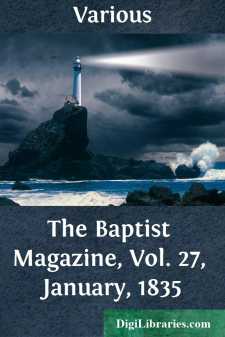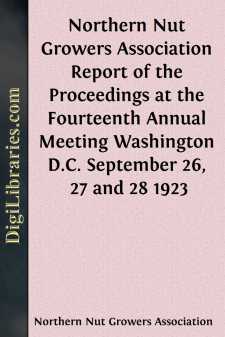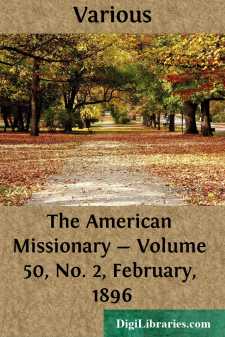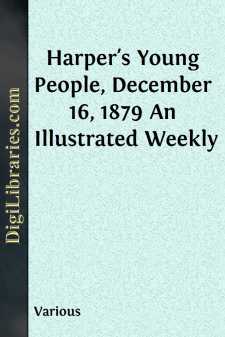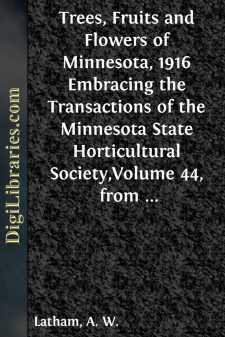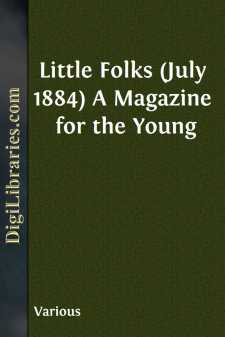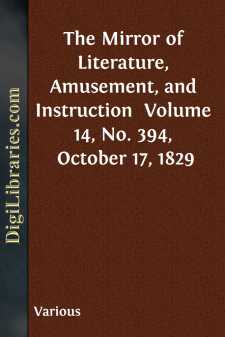Periodicals
- Art 27
- Children's periodicals 59
- Entertainment 5
- Food/Wine 2
- Games/Humor 455
- General 661
- Health 1
- History 53
- House/Home 1
- Regional 62
- Science/Nature 118
- Transportation 10
Periodicals Books
Sort by:
by:
Various
Recollections of departed excellence are always pleasant, often deeply interesting, and sometimes productive of the happiest effects. The delight we feel in tracing the successive stages of that pilgrimage by which the saints of the Most High have “passed into the skies,” is neither a faint nor fruitless emotion, but a healthful exercise of the moral sympathies. It purifies, while it elicits; the...
more...
CONSTITUTION ARTICLE I Name. This society shall be known as the NORTHERN NUT GROWERS ASSOCIATION. ARTICLE II Object. Its object shall be the promotion of interest in nut-bearing plants, their products and their culture. ARTICLE III Membership. Membership in the society shall be open to all persons who desire to further nut culture, without reference to place of residence or nationality, subject to the...
more...
by:
Various
"Boys," said Tom, as he was kindling the fire the next morning, "do you know what day it is?" "Saturday, of course," replied the others. "You're wrong; it's Sunday." "It can't be," exclaimed Harry. "But it is," persisted Tom. "Last night was the sixth night that we've slept out-doors, and we started on a Monday." Tom was right;...
more...
by:
Various
THE OUTLOOK. The debt-showing in our treasury has varied during the last few months. At the close of August, 1895, it reached its highest point during that fiscal year, amounting to $101,151.66. During the next three months it was reduced considerably below that highest figure; but now, at the close of December, it has reached the amount of $104,943.95. It would be difficult to show in detail the...
more...
by:
Various
Mrs. Douglas was looking over her shopping list, and Lily Douglas was looking over her mother's shoulder. The Christmas Charity Fair was so soon to be held that Mrs. Douglas had a world of business to attend to, for of course her table must be full of pretty things suitable for the season. She was going out this morning to finish all her purchases, and Lily had been promised a corner of the...
more...
by:
A. W. Latham
President's Greeting, Annual Meeting, 1915. THOS. E. CASHMAN, PRESIDENT. This is the forty-ninth annual meeting of the Minnesota State Horticultural Society. Nearly half a century has elapsed since that little band of pioneers met in Rochester and organized that they might work out a problem that had proven too difficult for any of them to handle single handed and alone. Those men were all anxious...
more...
by:
Various
A "WHITE SQUALL." Hurrah for the Mediterranean! Hurrah for the tideless sea! with its sunny skies and sparkling waters, blue and bright as ever, while English moors and German forests are being buried in snow by a bitter January storm! Well might one think that these handsome, olive-cheeked, barefooted fellows in red caps and blue shirts, who cruise about this "summer sea" in their trim...
more...
by:
Various
CHAPTER I.—THE MOOR. Crimson and gold. As far as one could see across the moor it was one broad expanse of purply heather, kindled into a glowing crimson by the blaze of ruddy sunshine, and lighted here and there by bright patches of the thorny golden rod. Dame Nature had evidently painted out of her summer paint-box, and had not spared her best and brightest colours. Crimson-lake, children; you know...
more...
by:
Various
THE CONFLICT. The pyramids, temples and palaces of Thebes are monuments of the ancient intellects of our race. Great thinkers only were capable of giving to the world the Vedas, the Apollo Belvidere and the Parthenon. The arts and astronomy of Egypt harmonize very poorly with the idea that modern scientists have all the wisdom and intelligence known in the history of the ages. Among the wonderful...
more...
by:
Various
LORD GROSVENOR'S GALLERY, PARK LANE. At the commencement of our Twelfth Volume, we took occasion to allude to the public spirit of the Earl of Grosvenor, in our description of his splendid mansion—Eaton Hall, near Chester. We likewise adverted to his lordship's munificent patronage of the Fine Arts, and to the erection of the Gallery which forms the subject of the annexed Engraving. The...
more...


